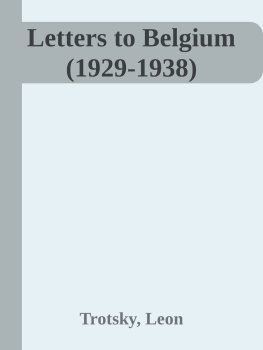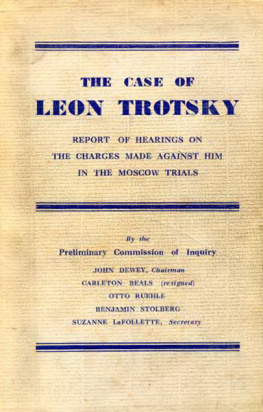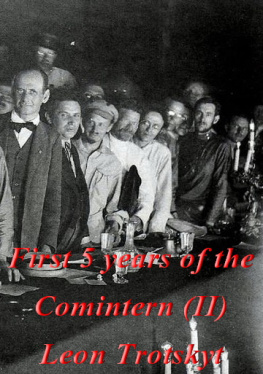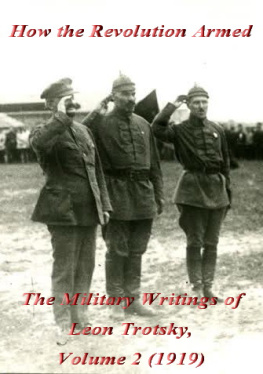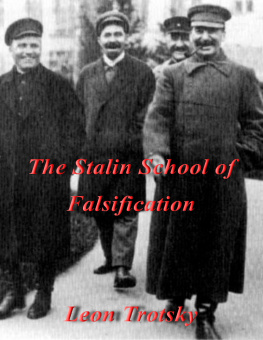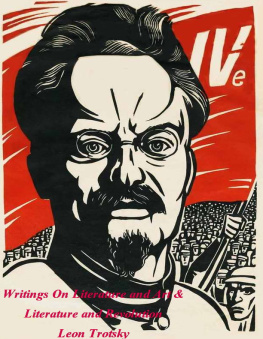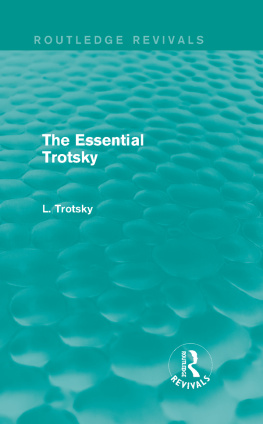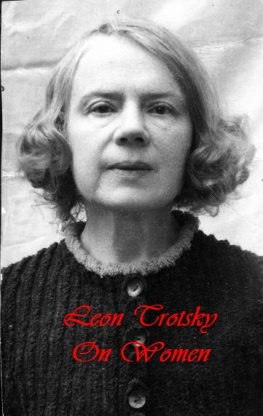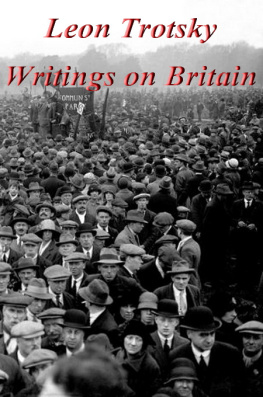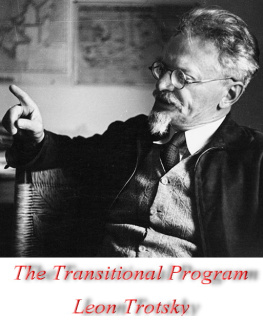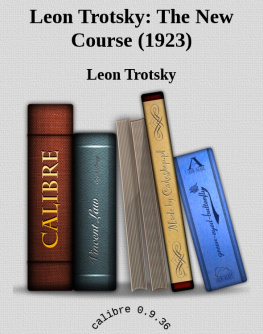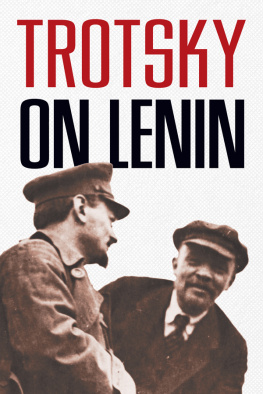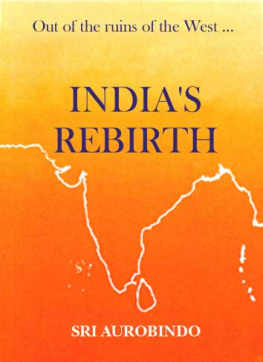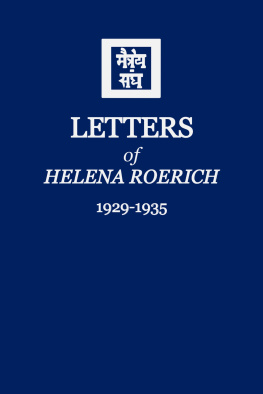Trotsky - Letters to Belgium (1929-1938)
Here you can read online Trotsky - Letters to Belgium (1929-1938) full text of the book (entire story) in english for free. Download pdf and epub, get meaning, cover and reviews about this ebook. publisher: Marxists Internet Archive, genre: Romance novel. Description of the work, (preface) as well as reviews are available. Best literature library LitArk.com created for fans of good reading and offers a wide selection of genres:
Romance novel
Science fiction
Adventure
Detective
Science
History
Home and family
Prose
Art
Politics
Computer
Non-fiction
Religion
Business
Children
Humor
Choose a favorite category and find really read worthwhile books. Enjoy immersion in the world of imagination, feel the emotions of the characters or learn something new for yourself, make an fascinating discovery.
- Book:Letters to Belgium (1929-1938)
- Author:
- Publisher:Marxists Internet Archive
- Genre:
- Rating:5 / 5
- Favourites:Add to favourites
- Your mark:
- 100
- 1
- 2
- 3
- 4
- 5
Letters to Belgium (1929-1938): summary, description and annotation
We offer to read an annotation, description, summary or preface (depends on what the author of the book "Letters to Belgium (1929-1938)" wrote himself). If you haven't found the necessary information about the book — write in the comments, we will try to find it.
Letters to Belgium (1929-1938) — read online for free the complete book (whole text) full work
Below is the text of the book, divided by pages. System saving the place of the last page read, allows you to conveniently read the book "Letters to Belgium (1929-1938)" online for free, without having to search again every time where you left off. Put a bookmark, and you can go to the page where you finished reading at any time.
Font size:
Interval:
Bookmark:
4 January 1936
Dear comrades
The last issue of the Spartacus (Belgium) public and forcesme to put the problem to you a formal manner.
The Antwerp comrades whom you know have indicated their unhappiness with our Belgian comradesattitude and with our international organisation to Vereeken We may concede that they will come out much stronger thanwhen they went in, which would show the correctness of entry. But that is not the problem. Theexpulsion can and must create conditions for a fusion with the Vereeken group, at least if Vereekentakes his responsibilities to the organisation seriously.
In this matter the Antwerp comrades are a problem because they [...] the normal relationsbetween organisations and encourage Vereekens negative attempt. At the very moment thatnegotiations can be started for fusion, this must be stopped. We must know precisely whereour organisation starts and the other ends. I have already pointed out that theimpatient and the conciliatory anarchists stay outside a real fusion. Since I am involved in thisunpleasant affair, I will give you a little example of the mood among the Antwerp comrades: in myfirst letter on the subject of their objections I justified the impossibility of an immediatecollaboration in the following terms: the Charleroi group does not want to appear in the eyes of theleft wing to be the agent of a group outside the party. The Antwerp hard men tell us thatthey have no stupid conditions that I am attributing all this to themand so on etc. The phrase quoted above, with the word appears, excludes thisinterpretation. There would not then be a question of allegations in this context.But in their writings the Antwerp people allow themselves the sort of methods used between tworival organisations. They show that they feel closer to Vereekens group than to us. For itis he that they defend and we that they attack, disloyally, in their letter and through Vereeken inSpartacus
They explain to us that they had envisaged a narrow and illegal organisationalcollaboration between the Charleroi group and Spartacus. I would not wantto be brutal, but I cannot help saying that any such conception of things is childish. Would asecret meeting between Vereeken and Lesoil be the only collaboration between the two organisations?If it is a question of illegal contacts at the top how can the Antwerp people know anything andcontrol it? They do not belong [...] Belgians. Perhaps such a thing has taken place without their knowledge. Andif they demand to be informed of this illegal collaboration the same right must be guaranteed toeach member of the two organisations. What is then left of yesterdays greatsecret? In the eyes of the Dauge group it might look as if Lesoil is secretlyplotting with Vereeken against them. And the ASR would collapse immediately. You must also considerthe existence of middlemen who collect document after document and put down on paper all thesecrets before they have seen the light of day.
The comparison with the relations between Lesoil and the IS is ridiculous. That fact that Lesoilwrites once a month to old friends in Geneva or a letter to me, that he can calmly show to any organisation that hewishes, is something else. It is something quite different to practise secret collaboration betweentwo organisations in Belgium. In this case the absolute loyalty of everyone must becounted on. The attitude of the Antwerp people shows all by itself that such a thing would bedangerous.
These examples of childish lack of comprehension of the real difficulties are enough to make ussay again: the comrades must be called to order.
Letter in German to theAusland-Komitee (Foreign Committee) of the IKD. 7905 Harvard Library.
The letter is addressed to theleadership of the German section in exile as it concerns the attitude of the Antwerp comrades, inparticular one of the exiled leaders, Fritz Besser alias Brink (1908-1977)
Entry in to the POB had beendecided by a general meeting of the Belgian section on 10 March 1935. Those in the minority, moreor less all the Brussels branch, decided to keep an independent organisation and after publishingfour issues of the Voix Communiste in a period of two months started to publish afortnightly Spartacus, subtitled Organ of the International Communist League(Trotskyist) in Belgium
The group of the Belgian section inAntwerp were strongly influenced by the Dutch party of Sneevliet which had been, like the Belgianminority, hostile to the policy of entrism in France and Belgian. A minority had supported thedemand for unity between the entrist and independent groups. It hadbeen expelled on the initiative of Polk. Spartacus had made this expulsion and theposition of the minority public in an article A Reconciliation Which Is Not Without Dangerabout a reconciliation occurring between the ASR and the Liga as a result of the attacks on the twoof them by the POB.
Georges Vereeken (1898-1978), taxidriver, central committee member of the Belgian CP, had been one of the pioneers of the LeftOpposition in Belgian and until 1934 one of the principal leaders of the Belgian section (BrusselsFederation) and member of the IS. He led the minority hostile to entrism in France and Belgium andhad been the main leader of the LCI who put out Spartacus and had signed theOpen Letter in August 1935
Lodewijk Polk (1902-1942) once aworker in the Bell Telephone company and then a diamond cutter in Antwerp was one of the leadingworkers in the Opposition then the Belgian League at Antwerp where he was active at this time , onbehalf of the Belgian section in the POB and the Liga.
Leon Lesoil (1892-1942) miningtechnician, won to communism in Russia where he was serving as a soldier, had been one of thefounders and first leaders of the Belgian CP and then the Left Opposition and the leader of theWorkers federation of Charleroi. He had led the famous miners strike in this regionin 1932 and then was the leader of the Belgian section after its split with theBruxellois Van Overstraeten and Hennaut. He had been a supporter of entrism and hadbeen the real leader of the group that was active in the POB and which had grouped roundAction socialist revolutionnaire. Trotsky had a particularly high opinion of thisreal working class communist. Walter Dauge (1907-1944), an ex-student and then a radio announcerwho was sacked, was a member of the national committee of the Jeunes Gardes socialistes andsecretary of their federation in the Borinage and one of the young leaders of the Left in the POB.His attachment to proletarian anti-militarism and a trip to the USSR in 1935 had brought him closerto the Trotskyists in the POB. He became the standard bearer of the tendency which, in the summerof 1935, had regrouped around the weekly Action socialiste revolutionnaire. He wasin league with the Trotskyists but had not totally won their confidence, that of Trotsky inparticular.
The expression Charleroigroup meant the entrist Belgian section, the Lesoil group.
Several illegible words.
Geneva is the codefor the HQ of the International Secretariat and sometimes the IS itself.
29 March 1936
Dear comrade Fux
I have not had a reply from you to my last (letter). But I wish to write once moreto salve my conscience.
I have the feeling that you would be able to have important successes but that a great dangermenaces you, the same which has compromised the gains of our comrades in France.
Font size:
Interval:
Bookmark:
Similar books «Letters to Belgium (1929-1938)»
Look at similar books to Letters to Belgium (1929-1938). We have selected literature similar in name and meaning in the hope of providing readers with more options to find new, interesting, not yet read works.
Discussion, reviews of the book Letters to Belgium (1929-1938) and just readers' own opinions. Leave your comments, write what you think about the work, its meaning or the main characters. Specify what exactly you liked and what you didn't like, and why you think so.

